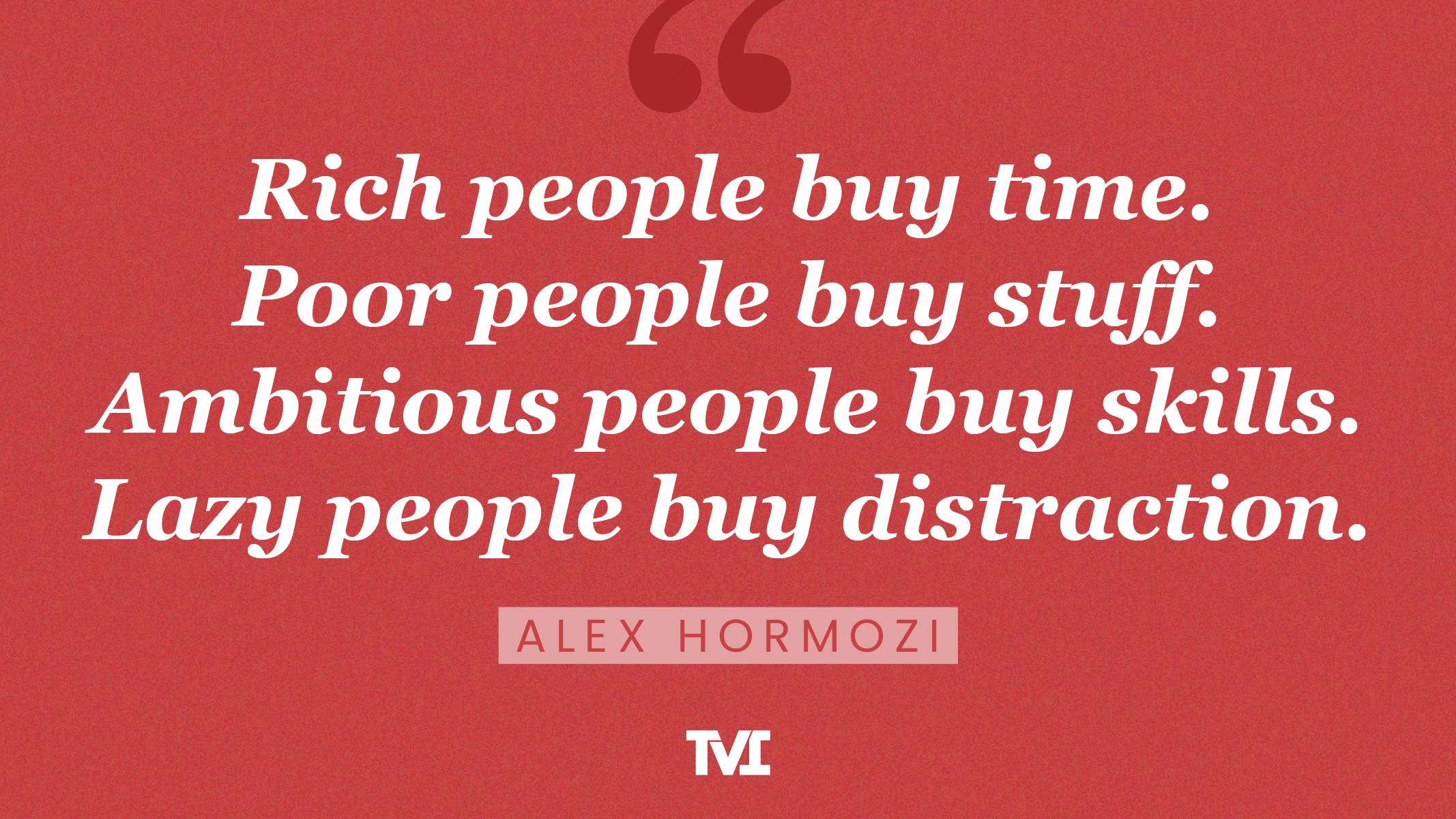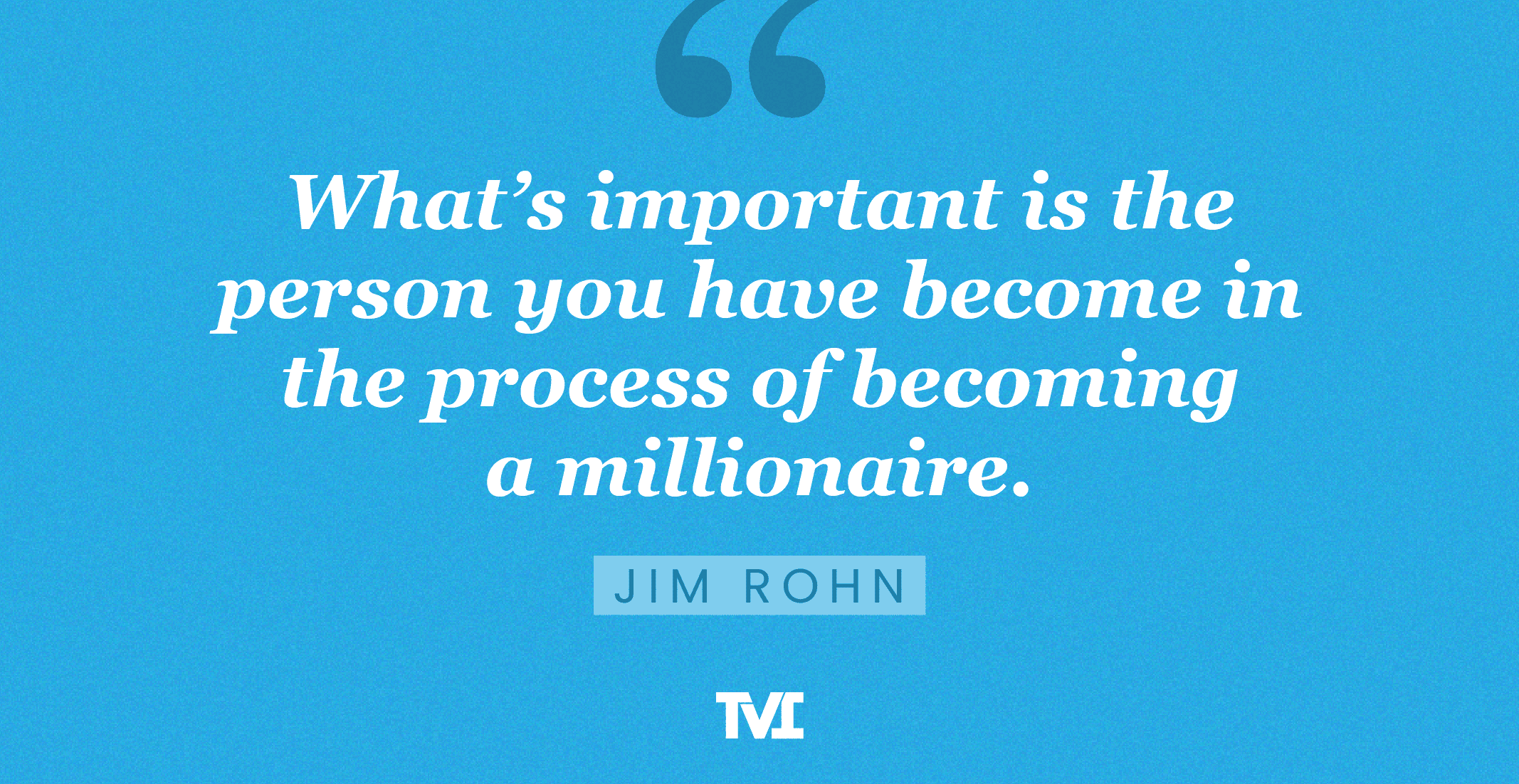
If you want to build wealth, you need to build a wealth mindset. And that means deconditioning yourself from all of the beliefs that keep most people poor.
Because a lack of money isn’t a circumstance. It’s a mindset.
You can be broke with a wealth mindset and a plan to build in the future. But it’s impossible to get rich with a poor person’s mindset.
Money beliefs run deep. They’re emotional. They are programmed into you from childhood, passed from your parents and their parents and their parents.
There’s an entire societal apparatus designed to make you believe certain things about money and wealth—and that’s hard to unravel. Building wealth requires you to think and behave in a way that’s counterintuitive and unnatural to the way the average person operates.
You have to rewire your beliefs about risk, gratification, morals, ethics, and even spirituality if you want to have a wealth mindset that gives you the financial freedom, flexibility, and lifestyle you desire.
These wealth mindset quotes from 8 successful entrepreneurs will help you develop the outlook it takes to get rich.
Invest in what matters
“Rich people buy time. Poor people buy stuff. Ambitious people buy skills. Lazy people buy distraction.”
—Alex Hormozi
I look at this quote and it reminds me of many different scenarios in my life. I am not rich, but I have enjoyed a small amount of financial success, enough that it has changed my perspective about money and what it’s good for. The wisdom in this quote continues to become more profound and true with each passing day.
I’ve realized that time is the most important asset of all, and I’m continuing to structure my life in a way that frees up more time—time that I can either spend enjoying my life or focusing on higher-leverage activities that help me make more money.
My equation is simple. I create an ideal hourly rate for myself. Right now it’s $1,000 an hour. If I am going to spend time on a task that’s less than my hourly rate, I either automate, delegate, or eliminate it altogether.
I don’t cook my own food. I either eat takeout or use a healthy meal service. I don’t clean my own apartment. I don’t do my own laundry. Domestic tasks drain me mentally, and they are far below my hourly rate, so I pay someone else to do them.
Inside of my business, I have paid people to free up my time—so I can spend more time making money. I hired a virtual assistant to handle all of the minutiae inside of my business. I hired a client success manager and a product strategist to help students in my online course (at scale and without my involvement). I have an editor for my YouTube videos.
I could manage every detail of my community, answer all my emails, and edit my own videos, but the opportunity cost involved doesn’t make sense—not just logically, but mathematically.
When I think of what it took to get to this place (where I was able to hire people to free up my time), I think of this phrase in the quote:
“Ambitious people buy skills.”
I have made several bets on myself when it comes to “buying skills.”
The concept of buying skills goes like this: An expert has taken years of their life to figure out how to do something. They’ve distilled all of that wisdom into a digestible format, and you can “download” their wisdom for pennies compared to what it cost them to acquire it.
I have made that trade many times.
At first, when I didn’t have much money, I applied this concept by consuming books. Books have significant ROI. You can learn from some of the smartest, most skilled, and most accomplished people for the price of a fast-casual meal.
After a while, I started investing in online courses. I bought a $200 writing course that taught me blogging skills. I used those skills to make $470,000 writing blog posts on Medium as well as six figures in freelance writing work.
I bought a course for $750 that taught me how to self-publish Amazon Kindle books. I have made more than $100,000 in royalties from the three books I published. I’ve invested roughly $50,000 in business coaches that have helped me make $867,000 in online courses and coaching revenue.
I share these numbers not to brag but to show how much ROI these investments have made. Hormozi has another saying that sounds cheesy, but it’s true:
“Instead of investing in the S&P 500, invest in the S&ME 500.”
This means that you are far better off investing in yourself than in the market. Alex’s advice? As you get richer, continue to invest in skills until you have so much money and you’re so skilled that you no longer need to.
Most people don’t think this way. They’re wired to save, preserve, and conserve what they have.
Ironically, their primary driver to have more money is the main reason why they don’t. It takes some time to rewire yourself, but you must change your thinking about what money is useful for if you want to get richer.
Don’t take shortcuts—building wealth requires work
“Spend each day trying to be a little wiser than you were when you woke up. Discharge your duties faithfully and well. Step by step you get ahead, but not necessarily in fast spurts. But you build discipline by preparing for fast spurts… Slug it out one inch at a time, day by day, at the end of the day—if you live long enough—most people get what they deserve.”
—Charlie Munger
I can’t picture a reality where you work diligently day in and day out for years, iterate along the way, spend all of your time learning how money works, and you somehow end up poor in the long run. It just doesn’t feel possible.
Most anything can be accomplished given a long enough time scale. But most people don’t take the time to do what is required. I work with creators, freelancers, and business owners often. Most of them underestimate what it takes to win by a large margin.
I’ll come across a freelancer who complains about not landing a deal after sending only 10 pitches. Not 10 pitches per day over an extended time horizon. No, 10 pitches total. I remember one time I was in a Facebook group for Medium writers, and a woman complained that she “wasn’t getting traction,” on Medium after posting three articles.
These examples might look funny when written down like this, but sadly, it’s more aligned with reality than parody based on what I’ve observed. Most people simply don’t try very long, work very hard, or exhibit even a modicum of patience. It’s that bad. But if you can, you can build wealth.
People ask me how I got good at writing. I tell them I’ve been doing it every day for a decade.
I’ve been a proper entrepreneur for a handful of years, and I still feel like a total beginner because I am.
At this point, I am thinking in decades. I work hard, fighting impatience on a day-to-day basis, but I will work to improve every day until I die.
Building wealth takes time. The most difficult part of creating abundance in your life is having to go through all of the small and repetitive steps over and over until you have a breakthrough.
But, with time, and a bit of luck, success in life and business is pretty much inevitable. Time has a way of decreasing the negative impact of luck and increasing the positive impact of it.
Developing the skills necessary to build wealth is similar to the literal process of building wealth. Money isn’t the only thing that compounds. Your skills compound over time, too. The more diligent and consistent you are, the easier it is to stay consistent and the rewards are higher.
Most people overestimate how difficult the process will be from start to finish. They think the whole journey will be just as hard as it was in the beginning. They don’t realize that they’ll be able to get more output for the same level of effort later on.
Skills that were once very difficult become second nature to you. When you collect wisdom from different fields and disciplines, you create mental models in your mind that you can use to make important decisions, create unique ideas, and influence others to your cause.
Wisdom is the path to wealth. And it’s also something you simply can’t shortcut.
Bet on THIS and understand skills come first
“When you are young, work to learn, not to earn.”
—Robert Kiyosaki
Wages teach you all the wrong lessons about money:
- Time for money trap: Tie your income to your time, sweat, labor—pieces of your life.
- Save money: Smart people use money to buy back their time and, more importantly, to make money from their money.
- Debt: The “American Dream” sets us up for hundreds of thousands of dollars in debt—student loan debt, buying a home, conspicuous consumption (credit card debt).
- Risk in the wrong direction: It’s not risky to bet on yourself. It’s riskier not to.
- Incremental gains: Get a 3% cost of living raise at the end of the year instead of finding a vehicle (entrepreneurship) that can exponentially grow your income.
If you want to stop struggling, scraping, and clawing to make money and instead become the master of your money: Stop thinking like an employee and start thinking like a business owner.
The employee mindset teaches you to expect immediate gratification for your efforts, e.g., a paycheck. Ironically, the people who focus on money too soon end up making less money in the long term.
People who build a wealth mindset understand that skills come first. They work toward building expertise that can scale. Instead of focusing on simply getting a paycheck, they take the time to create or invest in something that continues to help them build wealth over and over again.
They create products, buy real estate, own intellectual property, and do other activities that have the potential to have huge payoffs down the road.
They’re dedicated to developing skills that can help build wealth, like sales and marketing—both of which require sacrificing short-term progress for eventual results.
Instead of taking a bunch of money upfront, they’ll often take time to intern and study under someone who knows the field well for little to no money. Why? Because they understand the things they learn in the process will be much more valuable than a big paycheck right away.
Related:
Develop a proper relationship with money
“Resenting the rich is one of the surest ways to stay broke”
—T. Harv Ecker
Money is an emotional topic. Many people have been misled to believe that “money is the root of all evil.” The full Biblical quote is actually “the love of money is the root of all evil.”
You can’t have what you hate. If you hate and resent rich people, you will never become rich because your subconscious programming will sabotage your efforts.
There are a ton of misconceptions the average person has about rich people. Perhaps you’ve heard something like “rich people steal to create wealth,” when, in reality, rich people create value to build wealth.
An entrepreneur who creates a product that improves people’s lives gets rewarded with money. And if they do it at scale, they make a lot of money.
Some people hate Jeff Bezos, but Amazon is a phenomenal product. You can buy pretty much anything and have it at your doorstep in as little as a day. While the average business won’t see Amazon-level success, they do create wealth by creating in-demand products people voluntarily pay for.
The entire business ecosystem on planet Earth makes the world go round. You wouldn’t want to live in a world where there wasn’t a massive financial incentive for people to build things of value.
The products of businesses are everywhere you look—from the computer or phone you’re using to read this post to the clothes you’re wearing right now to the food digesting in your stomach to the chair you’re sitting on.
Even within a single product like a phone or a computer, you have perhaps dozens of businesses coordinating to build the product—from parts manufacturers to microchip processers to mineral and metal mining companies.
This is the miracle of modern-day life, where you have a higher quality of living and access to information, all thanks to entrepreneurship and innovation.
Once you understand this, you can move to the business owner side of the equation without guilt—and start building wealth.
Are there greedy and shady people in the world? Yes, of course. But you can build wealth in an ethical and honest way.
Once you do, you can use that wealth to continue making a positive impact on the people around you and the world as a whole.
Change your definition of success
“To be a success, you only have to be right once. One single time and you are set for life.”
—Mark Cuban
The conventional wisdom about business success is often misleading.
We’re taught to think about business like we think about school—that we need to get everything right, follow a strict set of rules, and avoid mistakes at all costs.
But the reality of business success looks very different. It’s not about perfection or even consistent excellence. Instead, it’s about understanding a few key principles and being positioned to capitalize on opportunities when they arise.
You’re developing skills you know will pay off in the long run. You’re not too concerned with exactly when you’ll become wealthy because you know that with enough time, ideas, and consistent action, something will work.
There’s no such thing as someone who builds a successful business or becomes wealthy without some level of failure or mistakes. But those things don’t matter because you realize that you only have to make a few smart decisions to be really successful.
This runs counter to the way our education system works. A 50% grade in school means you’re a failure. But if you’re correct 50% of the time as an entrepreneur, you’d be filthy rich.
If you want to switch to a wealth mindset, you have to reframe the way you look at success. Success and perfection don’t belong in the same sentence.
Related:
Create abundance with a wealth mindset
“Fortunes require leverage. Business leverage comes from capital, people, and products with no marginal cost of replication (code and media).”
—Naval Ravikant
I mentioned focusing on developing skills that scale for a reason. You only have 24 hours a day. You have to sleep and live your life, too. Continually trading your time for money, with no leverage, will make it impossible for you to build wealth. Focus on creating assets and don’t worry about the lifestyle others live.
Think about a talented software engineer named Sarah making $120,000 a year. She’s doing what most people do—chasing the next promotion, hoping for a 10% raise, playing the linear game.
Best case scenario?
After five years of consistently strong performance, she might hit $180,000. There’s her cap. Her brain tells her this is the safe, logical path.
But let’s rewind and watch Sarah think exponentially instead. Same starting point, but a radically different approach. Instead of seeing her coding skills as a way to earn a salary, she sees them as leverage waiting to be unleashed. She takes those exact same skills and:
- Builds a SaaS product that solves a specific industry problem
- Creates technical content that reaches thousands of developers
- Consults for startups at premium rates
- Develops a course teaching specialized programming skills
- Uses automation to scale her impact without scaling her time
Five years later, her income isn’t capped at $180,000. Her SaaS product generates $50,000 monthly in recurring revenue. Her content platform brings in $15,000 per month in passive income. Consulting adds another $200,000 yearly working with select clients. Her course makes $100,000 in sales with each launch.
This is the difference between linear and exponential thinking. The linear path had Sarah trading time for money with a clear ceiling. The exponential path had her using the same skills to build assets that:
- Generate income while she sleeps
- Scale without requiring more time
- Compound in value over time
- Create multiple income streams
- Have unlimited upside potential
Our brains resist this kind of thinking because it feels riskier than the predictable paycheck. But in reality, depending on a single source of linear income is far riskier than building systems of wealth that can grow exponentially.
Again from Naval:
“Seek wealth, not money or status. Wealth is having assets that earn while you sleep. Money is how we transfer time and wealth. Status is your place in the social hierarchy.”
Focus on Naval’s four C’s to building wealth to get results like the example above.
The four C’s: The truth about leveraged wealth
Most people cap their income by trading time for dollars. Even high-earners like doctors and lawyers hit natural limits.
But real wealth builders understand leverage through what Naval calls the four C’s: Content, Collaboration, Code, and Capital.
Collaboration means building systems bigger than yourself. Smart delegation and strategic hiring let you focus on high-leverage activities. The goal isn’t just escaping the 9-5—it’s building machines that generate wealth without your constant input. Code is leverage in its purest form. Software can serve millions with minimal marginal cost. You don’t need to be a programmer—you just need to understand how to harness technology to scale solutions. Capital amplifies everything else. Whether it’s funding profitable ads, hiring key talent, or buying cash-flowing assets, money strategically deployed creates more money. It’s fuel for your other leverage points.
The real power comes from combining these tools. While most chase linear income growth, wealth builders create assets that compound and multiply. That’s the difference between climbing the ladder and taking the elevator to the top.
Don’t try to be smart, do this instead
“Investing is not the study of finance. It’s the study of how people behave with money. And behavior is hard to teach, even to really smart people. You can’t sum up behavior with formulas to memorize or spreadsheet models to follow. Behavior is inborn, varies by person, is hard to measure, changes over time, and people are prone to deny its existence, especially when describing themselves.”
—Morgan Housel
You don’t have to be a genius to build wealth. But you do have to learn to keep your emotions in check long enough to build wealth. In many ways, your brain is biased against the skills it requires to build wealth long term, e.g, the inability to delay gratification.
And when it comes to different paths to wealth like building a business and investing, you have to get an emotional grasp on important concepts. You can logically understand them, but logic means nothing if you can’t bring yourself to make the right decisions when it matters most.
Here are a few basic but emotionally-challenging concepts that are important in investing, which is a key to building wealth regardless of your main source of income:
- Risk — More risk equals the potential for more reward, but it also increases your odds of going bust.
- Fear — It’s all fun and games when the stock market is going up, but will you panic-sell when your investments suddenly drop 30% or will you hold?
- Greed — Your brain can trick you into thinking stocks are just going to go up, which can lead to you making FOMO trades and continuing to chase gains. Again, remember the risk.
- Time in the market — Time and compounding are your friends when it comes to investing. The earlier you invest, the easier it is to grow your money down the road.
- Luck — Much success in business and finance can be attributed to luck. Sometimes, you’re just in the right or wrong place at the right or wrong time. But like I said earlier, time and solid decisions tend to reduce bad luck.
- Quitting while you’re ahead — If you can grow your wealth without continuing to level up your lifestyle, you’ll be free.
Ready to stop trading time for dollars?
Final thought: Building a wealth mindset means becoming someone new
“After you become a millionaire, you can give all of your money away because what’s important is not the million dollars; what’s important is the person you have become in the process of becoming a millionaire.”
—Jim Rohn
The most important truth about building wealth isn’t about tactics or strategies—it’s about transformation. Wealth isn’t something you get, it’s someone you become.
All those nights spent studying markets, taking calculated risks, delaying gratification, and thinking long term? They will fundamentally rewire who you are.
Most people focus on the mechanics—invest in this, start that business, use these leverage points.
But they miss the deeper truth: Getting rich requires becoming a different person. Your current habits, thoughts, and beliefs are perfectly calibrated to your current net worth. Changing that number means changing yourself.
You have to develop the patience to play decade-long games, the discipline to reinvest when others spend, the resilience to weather failures, and the vision to see opportunities others miss.
This isn’t about learning new skills—it’s about becoming someone who embodies wealth-building principles at their core.
The money itself is only the scoreboard.
The real wealth is in becoming someone who can’t help but create value, spot leverage points, and think exponentially. Once you transform into that person, money becomes inevitable.
And even if you lost it all tomorrow, you’d build it back because wealth isn’t what you have—it’s who you are.






















